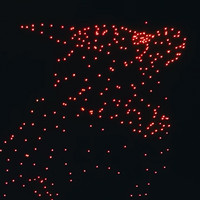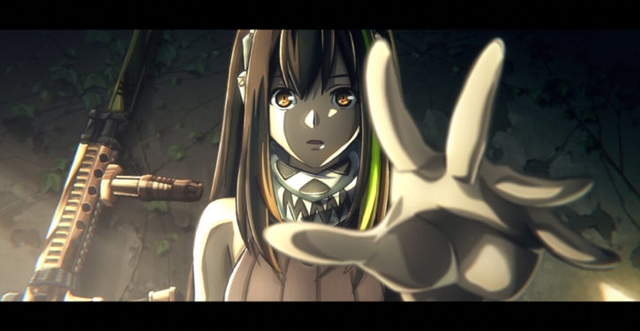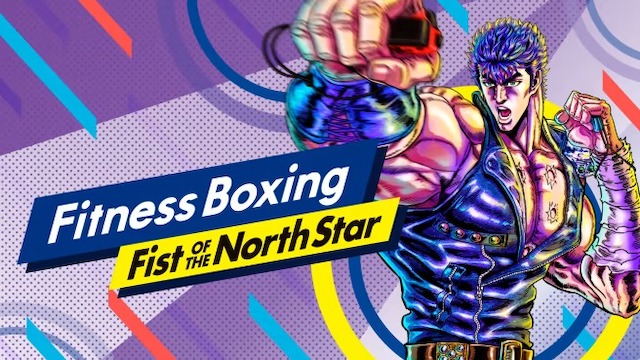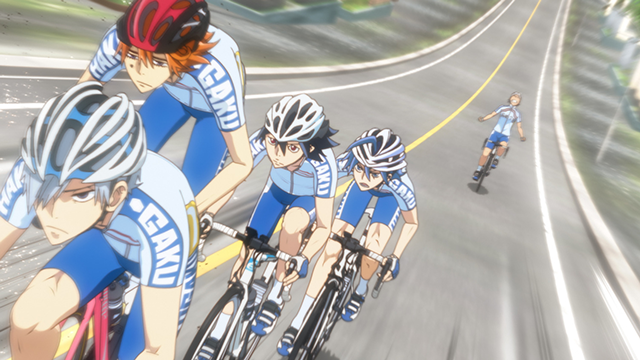#INTERVIEW: JUJUTSU KAISEN's Music Staff on Billie Eilish’s Influence on the Soundtrack and More
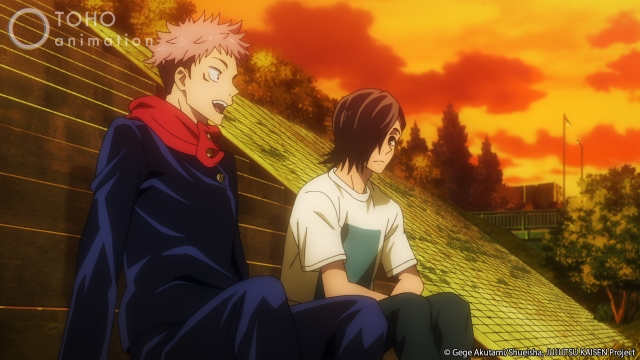
“#INTERVIEW: JUJUTSU KAISEN's Music Staff on Billie Eilish’s Influence on the Soundtrack and More”

Did the JUJUTSU KAISEN finale feel like a full-body experience to you? There's still one thing I can't get out of my head: the soundtrack. Last month, I got the opportunity to interview four members of JUJUTSU KAISEN's music staff about their experiences working on the series. Below, Music Producer Yoshiki Kobayashi and composers Hiroaki Tsutsumi, Yoshimasa Terui, and Alisa Okehazama share their creative processes, musical influences, favorite scenes, and more. If you're a fan of JUJUTSU KAISEN, you definitely don't want to miss out on this!
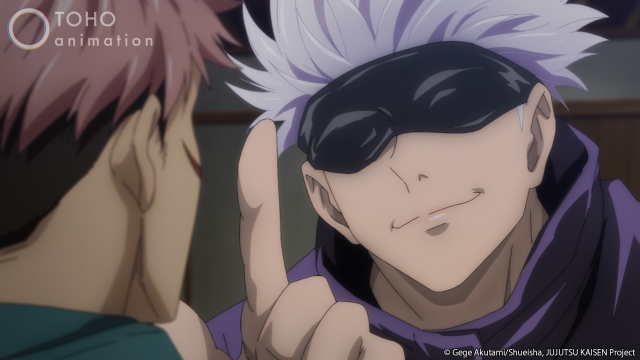
This was a rare case where three different composers were in charge of the background music, but could you tell us a bit about how that happened? How did you three go about producing the soundtrack?
Kobayashi: When we had our meeting with Gege Akutami-sensei, he suggested we go with a stylish, Billie Eilish direction. Then director Sung Hoo Park added on that he wanted some hip hop and rock, so I entrusted the work to Tsutsumi-san, Terui-san, and Okehazama-san, who I knew could create unique songs that fit the anime.
Tsutsumi-san is great with rock. He also has extensive experience with additional background music, so I figured Tsutsumi-san would be the center of the team this time. For a while now I’ve thought that Terui-san’s distinctive rhythms, melodies, and riffs are very unique and so is the way he creates them. He’s great with stylish songs. Then Okehazama-san knows how to work a synthesizer well, and her melodies are extremely pretty, so I asked her to join thinking she’d be perfect for the emotional tracks.
There were some co-written songs, but most were composed separately by one of those three. I always made sure everyone could listen to each other’s demos, so we could share the same direction for the show’s music and make sure we didn’t lose track of it.
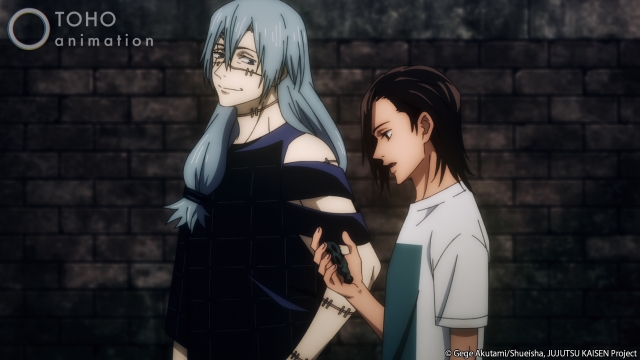
Tsutsumi: The songs were divvied up between the three of us based on the characters, tone, and music requested.
A few songs were assigned when the composer raised their hand for it, but Kobayashi-san, the music producer, had the final say on the division, and we each broadened our imagination as we made our demos.
We all received inspiration from each other as we worked on the composition.
Terui: I heard that both the original author, Akutami-sensei, and director Park had a strong focus on the music and they also wanted to use a broad range of genres for the background music, so producer Kobayashi reached out to three of us to realize those requests.
We decided who would be in charge of producing each song during our meetings with Kobayashi-san, and then we basically each worked on our own.
I wasn’t in charge of the theme music this time, but I was able to produce a few songs that I co-wrote with Tsutsumi-san and Okehazama-san.
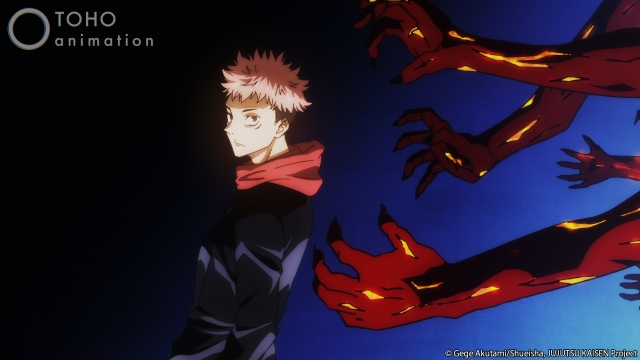
JUJUTSU KAISEN is a unique title with cursed spirits and jujutsu sorcerers. How did it feel to work on a show that would let you thematically address “dark fantasy” in a soundtrack?
Kobayashi: It’s set in Tokyo, and the addition of curses makes it seem more Japanese, but since I had worked with director Park before on The God of High School, I felt that it needed more of a western music feel than a Japanese dark fantasy feel. I felt like I had to respond to the stylishness of the footage that the director sought, and not let ourselves get dragged down trying to make it more Japanese.
Tsutsumi: Rock-style songs are my roots, and I felt like the setting matched the hard musical expression of that well, so it was very rewarding.
Terui: Many of the projects I’ve been involved with so far have basically been more about looking at the darker side of things than going in an open, positive direction, so I was looking forward to seeing how I could bring out my experience in new ways with this soundtrack.
Okehazama: This was my first time creating music for a dark fantasy, so I was a little anxious, but I was much more excited about it.
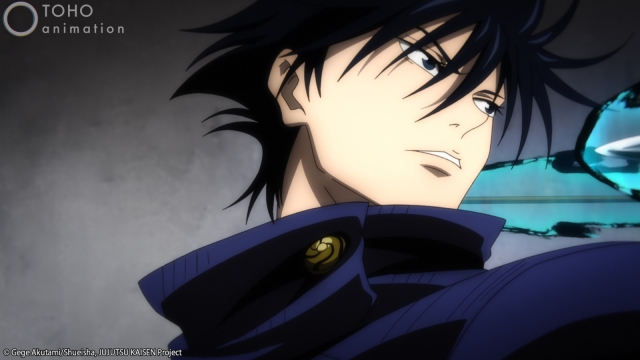
What kind of research did you do when you were assigned to the soundtrack? If you did any work to deepen your understanding of the title, we’d love to hear about it. If you were reading the original manga before working on the soundtrack, then what kind of inspiration did you take from the source material while composing the music?
Kobayashi: I’ve read every chapter in Shonen Jump since it first started running. It was my job to further my understanding of the title and convey that to the composers, so I participated in the scenario meetings so I could soak in what the director was thinking about, what the themes of each episode were meant to be, and what points they were debating over. Thanks to that I was able to pick on some minor details and proposed adding one more song at the very last minute to the director.
Tsutsumi: I had known about the title before, but the first time I really read through it was after I was assigned to the music. I organized the content of the title in my own way and laid out my own notes on how to convert that to musical expression before our first music meeting.
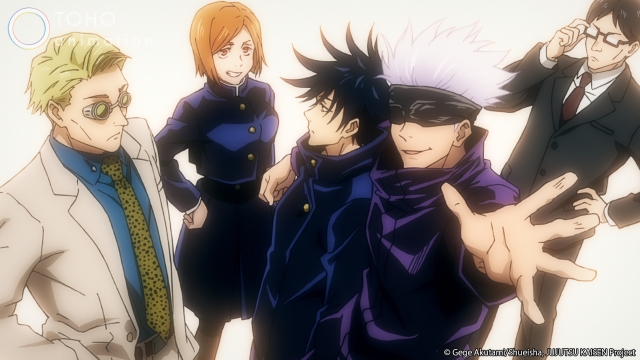
Terui: Reading through the original goes without saying, but I also researched what kind of music Akutami-sensei likes and I watched director Park’s past works.
"This is right at the heart of the current shonen manga," was the impression I got from the original. I love manga myself, and I found some inspiration in the homages to various other manga scattered throughout.
Okehazama: I began reading the original title after I was chosen to work on the music. I received inspiration from the story and the characters of course, but I also settled on the tone of the music based on the touches in the manga’s artwork.
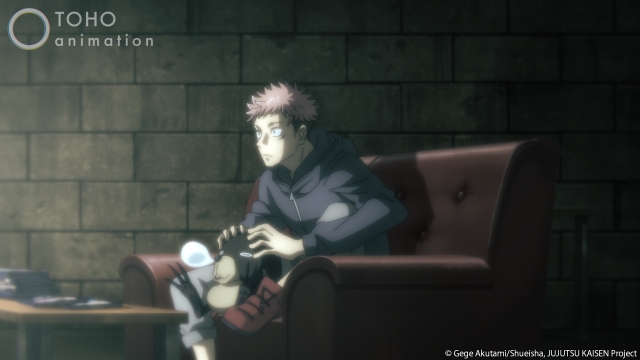
Itadori watches lots of movies to hone his skill with cursed energy, but were there any movie soundtracks or composers the music team drew inspiration from?
Kobayashi: It was only partial influence, but I imagined the songs coming in cool like they do in Spawn and Black Panther.
Tsutsumi: A TOHO Producer, Matsutani-san, had introduced me to the soundtrack for a movie called Us released in 2019, and I was inspired by its approach to sound.
Terui: This was my first experience with background music, so it wasn’t so much a specific movie’s soundtrack, but I listened to a broad variety of music from movies with a similar direction to broaden my perspective. Outside of soundtracks, I also felt that something which bridged the abstract hip hop of shing02 and DJ shadow with the more recent trap hip hop style would get people hooked, so I referenced those (though ultimately the songs I ended up in charge of were mostly in a rock-style).
Okehazama: I didn’t use a particular title as reference, but I did proactively listen to hip hop and EDM music to gain a variety of ideas.
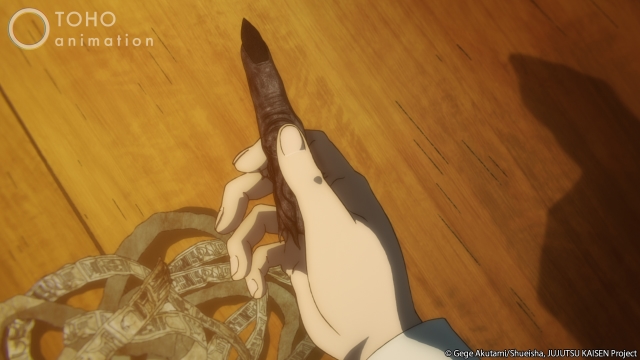
In Episode 2, there's a scene with Gojo and Itadori at a cremation center with a traditional flute and quiet electric guitar as background music. Not only was it an entirely anime-original scene, but it also shows a ritual that is not commonly portrayed in Japanese media. How did you work with the staff to create the sound to this scene, and what considerations did you take in showing the ritual of kotsuage (a traditional Japanese funeral cremation)?
Tsutsumi: I performed a song with the harmonics of a kantele (a string instrument from Finland) as the main motif in order to express Itadori’s maudlin state of emotion. I felt that the transparent, empty, and dignified air of that tone would support such a quiet scene without intruding on it.
We actually used a low whistle for the flute tones. When producing the music for JUJUTSU KAISEN we never recorded any Japanese instruments since the concept was to express that Japanese style with Western Instruments.
I used the electric guitar to express his inner strength and his resolve for the future that goes with his sadness. (I actually didn’t make this song specifically for the kotsuage scene, but I do believe it fit the mood of the scene and expressed Itadori’s emotions.)
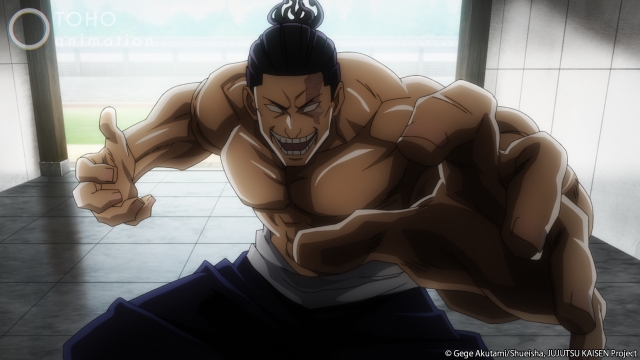
The artist Che Lingo helped provide the lyrics for the fight between Todo and Fushiguro in episode eight. Can you talk about how you found Che Lingo to help write the lyrics for the song and how it was written for the scene?
Kobayashi: Director Park put in an order requesting a rap, so I was introduced to him by Youki Yamamoto-san who I had worked with on Dr. STONE before and who was currently in London. When I heard his rap I thought it was cool and knew I wanted to ask him for it.
I told him the general tone of the music (and the details of the scene) beforehand, so Che came to the recording with a general idea in mind. We couldn’t go to London where he was recording due to the pandemic, so I decided to direct it online.
Tsutsumi: We were introduced to him by a composer living in England, Youki Yamamoto-san. We used the internet to connect London and Japan in order to do the recording. Each composer told Che Lingo where we would be inserting the rap, and what theme we wanted from the lyrics, and then we composed the lyrics and recorded the rap all on the same day as the recording.
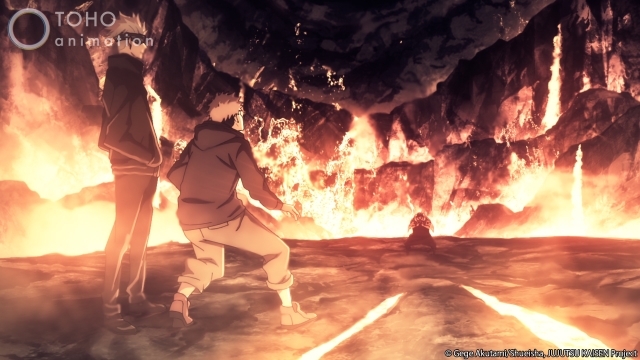
When Gojo fights Jogo in episode seven, we’re treated to heavy rock music. Later in the episode, after Itadori and Gojo enter Jogo’s domain expansion, we still hear cool rock music even though there isn’t as much fighting happening. Do you feel unifying the music to a genre like that throughout an episode is an effective way to convey a message to viewers?
Kobayashi: We don’t actually worry about unifying the genre of music in an episode. The reason for that is because there are developments within each episode, and I believe using the music that fits each development is how you should maintain the overall balance of the episode. It just so happened to work out that way in episode seven, but for example, I don’t think it would have been strange for the song for Hollow Purple from episode twenty to kick in with Gojo. Then it would have shifted from rock to EDM. Either way, it would have helped leave that impression of Gojo’s overwhelming strength, so I think following the nature of the show rather than a genre of music helps leads to better unification.
Tsutsumi: Episode seven was the episode that impressed Gojo’s overwhelming strength upon us. I felt the music was effective in emphasizing that strength.
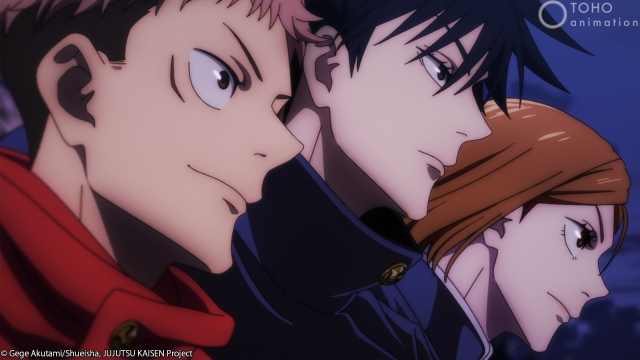
The music that plays when Todo questions each character changes between heavy-metal (during Fushiguro and Todo’s fight), house (when Itadori meets Todo), and even easy-going acoustic guitars (during Todo’s nostalgic high school scene). I found this musical storytelling in Todo’s scenes really charming. What kinds of things do you pay particular attention to in order to convey a character’s personality?
Kobayashi: On my end, I made sure each character was assigned to a specific composer. For example, Itadori and Todo were both assigned to Tsutsumi-san. Nanami and Fushiguro were assigned to Terui-san, while Kugisaki and Gojo were assigned to Okehazama-san, and they each composed for their characters. Because of that, we produced music that drew out their personalities and naturally ended up with a mix of genres.
Tsutsumi: I really cherish the sense and feel that I get when I first picture that character, such as the tempo or the sound of an instrument that springs naturally to me.
For example, when I pictured Todo, the first thing that came to mind was a chorus like a war cry, and taiko or other drum beats, and I felt that mid-tempo matched his unabashed nature, so those were the hints I worked from.
Terui: I feel like I get a lot of hints about the sound I should produce not just from the character’s appearance, but also as I consider their backbone and ideology. Once I’ve listed out as many words that come to mind, I then use my creativity to turn that into sound.
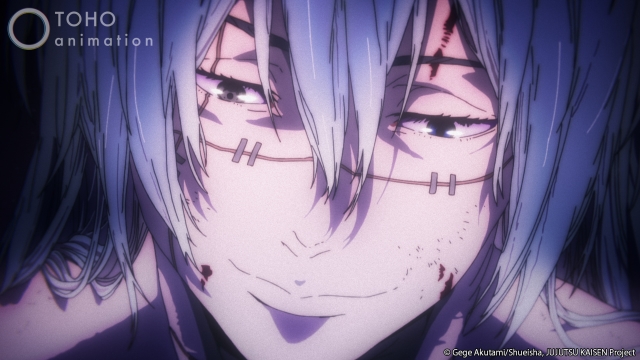
One of the most provocative story arcs is Itadori’s dealings with Mahito and Junpei Yoshino. At the end of episode thirteen, there's a really moving insert song titled “Stand in the Darkness” playing as Itadori monologues about “never losing again.” Was there anything specific about that storyline, or about JUJUTSU KAISEN in general, that inspired this song?
Kobayashi: The director put in a strong request here. It was the end of the first cour too, so he wanted the end of the cour to feel like a final episode and he told us he wanted to add in a song with male vocals. The order he gave us was for a ballad, so I really agonized over that, but I think we produced a wonderful song thanks to Steve Memmlo’s participation.
In the actual anime, the vocals only play for a short thirty seconds. For the first half, we used the instrumentals without the vocals, but that’s because Tsutsumi-san and I discussed it and proposed to the director that we make the first half instrumental-only since Itadori’s emotions haven’t reached that point yet in the first half.
On the soundtrack, you’ll be able to listen to the version with the full vocals that we recorded.
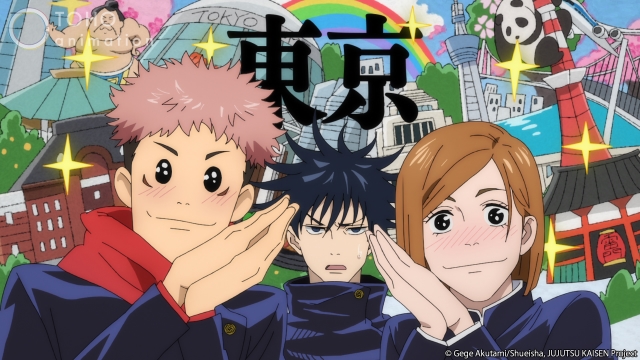
How have you felt regarding JUJUTSU KAISEN’s reception post-debut? Do you think fans are digging the mix of music genres represented?
Kobayashi: Everyone’s had their own unique interpretation, and frankly I feel that’s a job well done. Being able to enjoy your own interpretation of it means there’s more chances for people to enjoy it than a fixed impression would provide. It’s not a negative thing for people who grew up in different environments listening to different music to have different interpretations. I think such diversity is really great.
Tsutsumi: The charm of the original is spreading to so many more people through the anime, and I hope they’re enjoying it from the bottom of their hearts. I do think JUJUTSU KAISEN offers a very unique soundtrack. Even though we held true to the fundamentals of expressing emotions, we all worked together looking for new ways to combine instruments and express things as we created the songs, so I hope people can pick up on that foundational power.
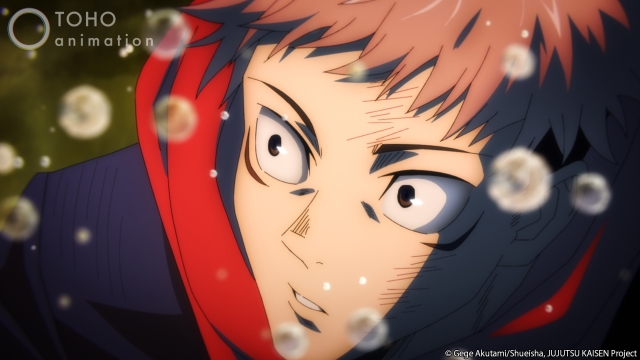
Terui: I think even more people are enjoying the show thanks to the synergy of the original work’s undamaged appeal and the appealing elements of animation like the motion and the performance of all the voice actors.
I’d be delighted if the music is also adding to that.
As for the mix of genres, honestly while part of me thinks some people might hesitate at that, I’m convinced this active approach produced wonderful results.
Okehazama: When I was creating the music I was very worried about whether people would enjoy it. However, after the reactions to the music from so many people through social media after it started airing, all of it positive, I think fans have come to love it too.
I’m very grateful to all the fans who sent me messages.
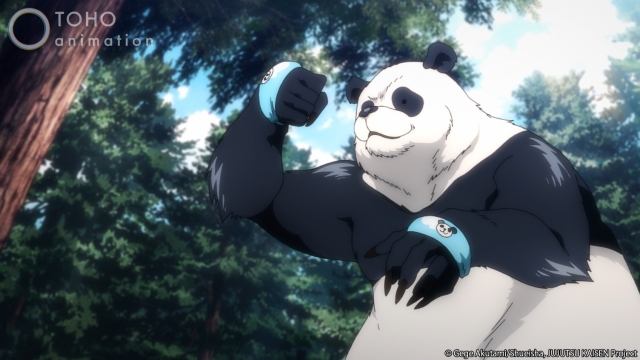
Having come this far since episode one, are there any personal favorite episodes or scenes you have worked on?
Kobayashi: Episode 16, Panda vs. Mechamaru. Che Lingo’s rap is just cool, and the story’s great, and I loved that episode in the manga too.
Tsutsumi: Gojo and Jogo’s battle in Episode 7. After Gojo proves he’s the strongest in JUJUTSU KAISEN, it makes it very easy for viewers to understand the setting and the power balance between the characters of episodes before and after, so I think that’s a key scene.
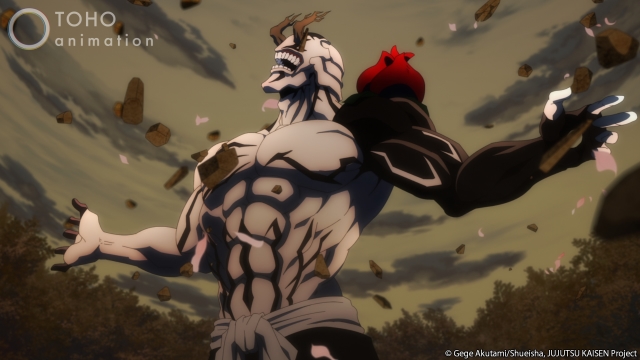
Terui: I have several scenes I love, but what comes to mind right now is the scene where Hanami awakens to the joy of battle in episode nineteen.
The animation there is incredibly beautiful, and the music was used wonderfully. I felt my mind getting hooked on MiMi-san’s performance with the hammered dulcimer (a percussion-stringed instrument) in that scene.
Okehazama: There are lots of scenes I loved, but I really loved "Jujutsu Koshien" in episode twenty-one. It’s one of my favorite scenes where we get to see the main characters act like high schoolers, which we hardly see on their typical missions.
There were also new additions original to the anime, and I found myself laughing.
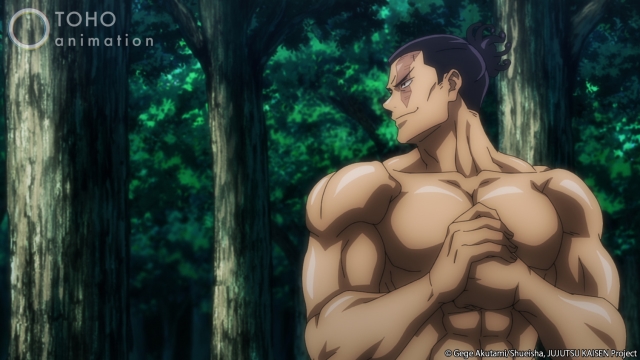
Anything else you would like to say to worldwide fans of JUJUTSU KAISEN?
Kobayashi: I take pride in my role here. I know there are lots of JUJUTSU KAISEN fans throughout the world, there’s only so much I can do, but I hope my ideas and efforts have helped boost the title and make it even more enjoyable.
Tsutsumi: I may be one of the staff members producing JUJUTSU KAISEN, but as an honest fan as well, I love this title and I always want to make it something wonderful. Let’s all share our excitement for JUJUTSU KAISEN!
Terui: I know it’s hard to encounter new things here when Japan is an island nation that doesn’t speak English, but Japan is filled with amazing anime, comics, music, and underground scenes in addition to big titles like JUJUTSU KAISEN, so if you got hooked on this, then I hope you’ll keep going and sample other works as well. You might encounter something wonderful.
Okehazama: To everyone watching JUJUTSU KAISEN, thank you very much. I’m very happy to have people watching worldwide in addition to Japan. JUJUTSU KAISEN has many serious scenes, but the characters are cool and appealing, and the wild action of the battles is impressive to watch. I hope you enjoy watching it all the way to the end.
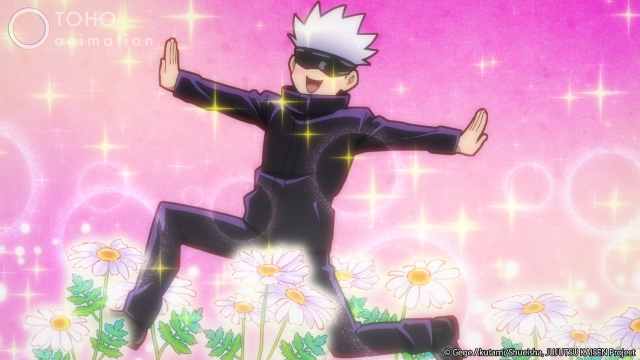
Did the JUJUTSU KAISEN finale rock your soul? Did it make your heart drop like a base? Let us know in the comments below!
Special thanks to Kobayashi, Tsutsumi, Terui, and Okehazama for their time and the JUJUTSU KAISEN team for their amazing work.
Blake P. is a weekly columnist for Crunchyroll Features. His twitter is @_dispossessed. His bylines include Fanbyte, VRV, Unwinnable, and more. He would like to see Mahito do the worm.
Do you love writing? Do you love anime? If you have an idea for a features story, pitch it to Crunchyroll Features!
If you liked the article, do not forget to share it with your friends. Follow us on Google News too, click on the star and choose us from your favorites.
For forums sites go to Forum.BuradaBiliyorum.Com
If you want to read more anime-manga articles, you can visit our anime-manga category.

